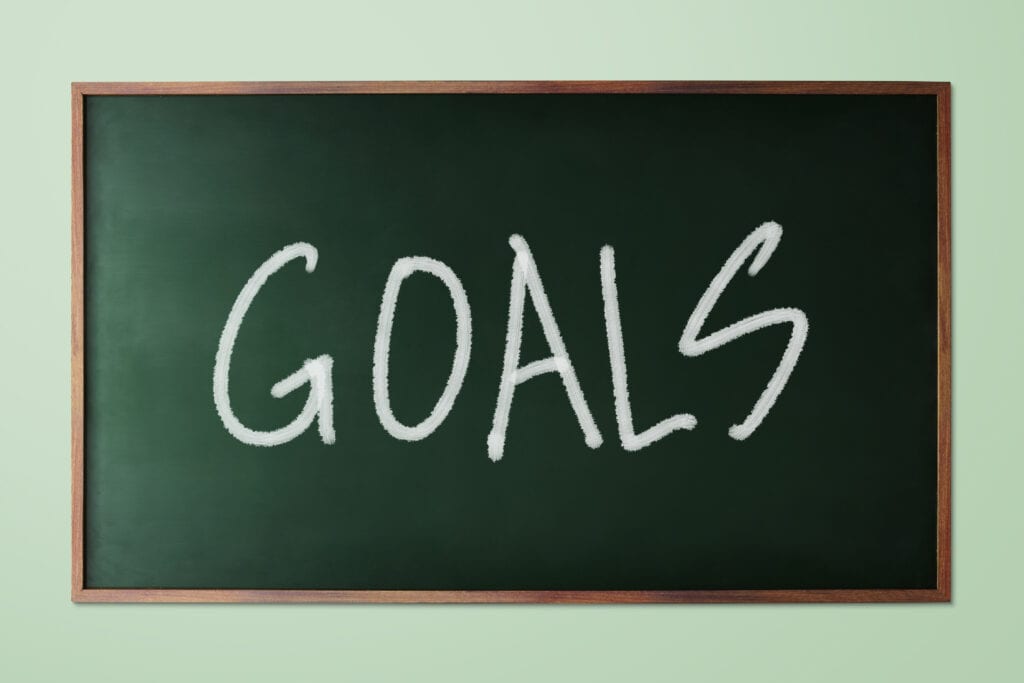Live the Best Year of Your Life
You may have tried to change your life before without much success. However, with an effective process, it’s possible to achieve more in a single year than most manage to achieve in a lifetime.
> Most New Year’s resolutions are little more than wish lists with no chance of success. In fact, the average person forgets all about their resolution within a few weeks.
> Setting goals is a powerful process, but only if done correctly. There’s much more to be done than making a list of desires and then waiting passively for them to be delivered.
Your current life situation is a combination of several factors. Your beliefs, past, habits, expectations, and resources are all factors.
A spectacular life requires balance. Wealth isn’t a substitute for poor health. A great relationship isn’t a substitute for having insufficient financial resources.
Making the next year the best year of your life is within your control. But there are several requirements. You have to know what you want, develop habits that support your goals, drop the habits that don’t support your goals, deal with obstacles, and stay the course.

Review Your Past
Common wisdom suggests that you should keep looking forward and leave the past in your rearview mirror, but this can be a mistake. The past has much to reveal. At the very least, you can learn where you’ve made mistakes. This is important, because you’ve been making the same mistakes over your lifetime.
> The reason your last relationship ended is likely to be the same reason your next relationship will end.
> Financial challenges repeat themselves.
> Your past challenges with work will be your future challenges at work.
> Your diet and exercise plans will fail for the same reasons they’ve failed in the past.
Failing to examine and address the challenges of the past is choosing to repeat your challenges and failures throughout the rest of your life.
The past also includes some pretty great things. Failing to identify these things is an obstacle to enjoying similar success in the future.
While answering the following questions, consider all areas of your life:
> Physical/health
> Finances
> Relationships
> Work
> Hobbies
> Spiritual/religious activities
> Family
Reviewing the past is a critical component of creating the future:
1. What were the highlights from last year? Create a list of at least five positive experiences from the last year. Go with your gut. Anything that fills you with positive emotions can be a highlight. It might have been something as simple as spending a perfect afternoon at the park with your child.
> Avoid relying on society’s values when defining your own success. It’s a success if it feels like a success. That may or may not align with conventional measures of success. Decide for yourself.
2. What were the low points and how could they have been avoided? It wasn’t all good. There had to be a few days or experiences you don’t want to repeat. Make a list of them and consider how these experiences could have been avoided. Minimizing the low-points in life is as crucial to your happiness as adding high points.
> Should you have been able to foresee the occurrence of these experiences?
> How can you prevent a future reoccurrence?
3. What were the best decisions you made over the last year? You undoubtedly made some shrewd decisions last year. What were they? How can you apply this information in the future?
4. What were the worst decision from the last year? Everyone makes mistakes. What were yours? When you look even further into the past, have you made similar bad decisions? Why?
5. What are five positive habits you’d like to add this year? Consider the long-reaching characteristics of habits. What are a few habits you can add that will make a big difference over the long haul?
> Diet, exercise, financial, and relationship habits can alter your future considerably.
6. What are five habits you’d like to eliminate this year? Bad habits can ruin your life. Which of your negative habits would enhance your life the most if you were able to eliminate them.
7. What are the most important relationships in your life and why? We’re all limited by our personal resources. Good relationships require time and mental effort. It only makes sense to spend those resources on the most important relationships. Also think about past relationships you’d like to renew.
> It’s also useful to determine why those relationships are important. Why do you receive from these relationships that makes them important?
8. Which relationships should you consider ending or minimizing? Just as you’ve accumulated possessions that now clutter your life, you have relationships that need decluttering, too.
> Consider all of your relationships, personal and professional. Which of these no longer serve you?
> Relationships are never static. It’s common for a relationship to change significantly over time.
Are you aware of your past? Take advantage of your past experiences. Examine your past and apply that information to the future. You’ll find that it’s common to make the same mistakes over and over. End the cycle by thoroughly reviewing your past.

Unless you’ve intentionally put your life in balance, it’s dost likely unbalanced. Having balance among the various parts of your life is necessary for happiness and well-rounded success. Focus on the areas of your life that you would consider low-rated.
If your life is out of balance, you could:
> Be financially successful at the expense of your social life.
> Be successful at your career at the expense of your relationships.
> Be successful at your spiritual interests at the expense of your career.
Without balance, you’ll be suffering in at least one aspect of your life.
This can be tricky. We live in a society that worships those that have accomplished amazing things, often at great expense. While it’s easy to admire these people, many of them are very unhappy. By giving too much attention to any single area of your life, other parts of your life will suffer.

Design Your Life Before Setting Goals
Before deciding that you’d like to a billionaire with a private jet and a set of 6-pack abs, determine the type of lifestyle you’d like to live. Your goals should support the life you’d like to live. Think about a perfect workday, weekend, and holiday. Ideally, your goals will help to make those a reality.
Determine the lifestyle you’d like to live:
1. How do you want to make money? With few exceptions, every adult needs to earn money to survive. The ways of earning money are only limited by your imagination.
> Do you want to make money by being altruistic?
> Do you want a corporate career?
> Do you want to be creative?
> Be a doctor? Astronaut? Real estate investor? Consultant?
> Work with children?
> Work with animals?
2. What working conditions do you prefer? Some people like to work in an office setting. Others like to work at home.
> Day/night?
> With others or alone?
> Required attire?
> Weekends?
> What time do you want to be home each evening?
> Are you willing to travel? Do you want to travel?
> Do you need your own office or is a loft-type setting preferable?
3. How are your finances? You don’t need a 7-figure salary to be happy, but it’s also not easy to be happy with a 4-figure salary. Are you able to maintain your budget? Do you even have a budget? How much debt do you have? Is your income acceptable? Is your money invested wisely for your situation? Will you be able to retire at a reasonable age?
4. Intimate relationships are important. Do you want to be married or single? Play the field or keep things monogamous? What do you need from a romantic partner? Consider the following characteristics a potential romantic partner might have:
> Attractiveness
> Career
> Available free time
> Sense of humor
> Supportiveness
> Tolerance
> Health
> Intelligence
> Kindness
> Interest in having children
> If you currently have a relationship, what is missing? What could be better? Are you satisfied with the relationship as it is?
5. Your free time affects your happiness and satisfaction. How much free time do you have each week? How much of it do you spend with your family? How much time do you spend on hobbies or with friends? How much time do you dedicate to spiritual activities and development?
6. Avoid underestimating the value of good health. Is your diet acceptable? Are you getting enough sleep? Enough exercise? Do you visit your doctor regularly? How is your current health? What do you want to change?
7. Spirituality. Do you meditate or pray regularly? Are you living life according to your beliefs? Are you aware of your beliefs? Do you regularly study spiritual materials?
8. How is your social life? Do you get out of the house as much as you’d like and spend time with people outside of your immediate family? How many friends do you have? How many would you like to have?
If you’re aware of your desired lifestyle, choosing goals becomes easy. Give this careful consideration. There’s no reason to have a goal of being worth $500 million if your ideal lifestyle only requires $2 million. Start with the end in mind and go from there.

Set Goals That Increase the Level of Balance in Your Life
After assessing your life, you should have a good idea of where your weaknesses lie. Time is a limited resource, so ensure that you’re spending it on the areas of your life that will provide the greatest returns. Seek balance and contentment will follow.
You can have multiple goals covering several areas of your life, but divvy up your time intelligently.
Find balance by choosing your goals intelligently:
1. Create one goal for each area of your life. You can create your own categories, but limit the number to 6-8. Set bigger goals in the areas of your life that are lagging or are the most disagreeable to you.
> It’s not a bad idea to rate each part of your life on a 1-10 scale. Set smaller goals in the higher-rated areas and more significant goals in the lower-rated areas.
> Choose goals that can be achieved within 12 months and are measurable. Being “healthy” isn’t a suitable goal. “Weigh 150 lbs. or less” is suitable.
> Be bold. You can accomplish much more in a year than you currently believe.
2. Determine habits that will support each goal. While we enjoy the stories of those that are successful, the truth is that path to success is quite boring. Losing 50 pounds is exciting, but 300 days of eating well, exercising, and avoiding snacks isn’t that thrilling. But that’s exactly what success is: performing effective habits over an extended period of time.
> Make a list of at least 10 habits that will ensure your success.
> Now choose the three habits that will make the biggest difference. Forget about the rest.
3. Determine the old habits you need to drop. Habits can make your goals easier or more challenging to achieve. Identify your current habits that are obstacles to your success.
> Those habits might be direct obstacles, such as wasting money or eating too much chocolate. Others can be subtler, such as procrastinating, wasting time, or having a negative attitude.
Excess and happiness aren’t well correlated. A balanced life is enjoyable and minimizes the low spots. Having enough money, love, friends, and health is preferable to having an excess in three of them and a lack in the other. Create a solid foundation before attempting to achieve something outrageous.

Gather Your Resources
For most goals, you’re going to need more than just yourself with your current level of knowledge and expertise. You’ll often require other people, advice, education, and new skills. The internet makes it much easier to find the people and other resources you require.
Get the help you need:
1. Determine what you need to learn. Do you already know everything you need to know in order to be successful? Most importantly, do you know enough to get started? What do you need to learn to take the first step? Remember all the potential resources available to you.
> Internet
> Books
> Online courses
> Local educational facilities
> Clubs
> Audio programs
> YouTube and other videos
> People
2. A mentor can be the most valuable resource. Imagine having access to someone that’s accomplished what you’re trying to accomplish. Unless your goal is highly unusual, someone else has already done it. Seek out these people and ask for assistance.
> You’ve probably had a golf coach, piano teacher, or other type of mentor in the past. It makes sense to have a coach for losing weight or launching an online business, too.
3. Time. Do you have the necessary time available? Some goals don’t require any more time than you’re already spending. Sticking to a budget might actually save time since you won’t be out spending money as much.
> However, most goals require time. Unless you currently have free time to spare, you’ll have to steal time from other activities. Surfing the internet, playing on your phone, and watching TV are the most common time-wasters. You may have to drop some more meaningful activities, too.
> If you can’t make the time for your goals, you might need more inspiring goals.
4. Other resources. If you’re going to be a guitar player, you’ll need a guitar. Do you have everything you need? Computer? Soccer ball? 3-piece suit? Office space? Reliable transportation? Business cards? The ability to cook healthy meals? Ensure you have everything you require.
> You many need financial resources to meet many of your goals. If that’s true, one of your goals might need to be financial in nature.
There are few things you can do completely on your own. You’re likely to need new information, skills, advice, or money to achieve your goals. Identify the key resources you will need and acquire them. Avoid underestimating the value of a great mentor.

Identify Potential Obstacles
Without any obstacles, achieving your goals and living the best year of your life would be easy. All you’d have to do is make a few decisions. But it’s not that easy. Life is full of obstacles that will derail your efforts if you’re not prepared. Unsuccessful people are easily dissuaded by obstacles.
Identify the obstacles that can stand in your way:
1. People. Interestingly, the people in your life can be the biggest obstacles you’ll face. There are very few people in your life that will be 100% supportive of your efforts. The remainder can directly or indirectly sabotage your efforts.
> Some people will try to help, but do the opposite. Some of the people in your life will have the best of intentions, but hinder your efforts. They may caution you to be realistic or remind you of past failures.
> Your overweight spouse might be threatened by your efforts to lose weight.
> Your brother might be upset if you make more money than he does.
> Keep your eyes open and pay attention. Most people want to see you do well, just not better than they’re doing themselves.
2. You. We all sabotage ourselves on a regular basis. We do so with our thoughts, habits, beliefs, and fears.
> It’s easy to determine if you’re getting in your own way. When you think about your goal, do you feel anything other than excited and enthusiastic? If so, you’re in danger of being your own worst enemy.
> Monitor yourself daily by reviewing your goals and noticing your emotional response. Any negative feelings about achieving your goal must be managed if you want to be successful.
> Your beliefs about yourself can be highly limiting. For example, the belief, “I’m bad with money” will be an obstacle to financial success. If you identify with being a shy person, your social life will have challenges.
3. Momentum. It’s tough to get started. It’s even a law of physics. It takes more energy to get something moving that it takes to keep it moving. Expect resistance early in the process of making changes to your life.
4. Randomness. Life itself presents obstacles. You can argue whether the universe is challenging you or if it’s simply bad luck. However, there’s no disputing that random things will get in the way during your pursuit of your best year ever!
Anticipate the things that can go wrong. Be prepared for the most likely obstacles. Expect resistance while you’re changing your life. Things won’t go smoothly 100% of the time. Get started and strive for consistent progress.

Do you Have What it Takes?
Attaining your goals isn’t just about having goals and doing the right things. That will work in the short-term, but you won’t have lasting success. It’s necessary to become successful in the areas addressed by your goals. You can’t just change your behavior and expect long- lasting results.
If your goal is to become a millionaire, you must become a person that has the characteristics of a millionaire. It’s necessary to have the belief system of a millionaire and the thought process of a millionaire. You have to be the type of person that takes intelligent risks and manages money well.
Cultivate the attributes that guarantee you’ll achieve your goals:
1. Make a list of attributes that support the achievement of your goals. Take each goal individually and consider the type of person that would achieve that goal. What do you need to become?
> More cautious or less?
> More self-esteem?
> A different attitude?
> A new set of beliefs?
> More outgoing?
> More health-conscious?
> More active?
> More proactive?
2. Create a plan for developing these characteristics. Find the resources you need to become a new version of yourself. Then apply those resources each day to make the necessary changes. When you change yourself, everything in your life will change, too.
> Some people allow their ego to get in the way and declare, “I’m fine just the way I am. I shouldn’t have to change.” You are fine the way you are – if you’re happy with your life! But taking your health more seriously, going back to school, or learning to speak French doesn’t fundamentally change who you are.
> Be brave enough to discover what you’re capable of.
3. Visualize the person you want to become. Once you can believe it, everything else will fall into place. Start convincing yourself that you have the new mindset and attributes by visualizing yourself with them.
Become the person you need to be. It’s important to be open to the idea of changing yourself and not just your behavior. When you change yourself, everything around you changes, too.

Putting It All Together
You now have all the parts necessary to create a comprehensive plan. Let’s use an example of someone that wants to lose 50 pounds in the next 12 months in a healthy manner. We’ll consider everything we’ve discussed up to this point.
Matt is single, 35 years of age, 250 lbs., and 6 feet tall.
Review the Past
> Matt was a healthy weight until he graduated from college. He then gained a few pounds each year until reaching his present condition.
> He has a history of making poor food choices. In his younger days, these poor choices didn’t affect his weight.
> Matt eats when he’s bored or stressed. It’s his primary coping mechanism. As a result, he keeps a lot of unhealthy comfort food in the house.
> Matt doesn’t mind exercise, but getting out of the house is a challenge for him. He has good intentions, but can’t seem to make it out the door for the drive to the gym.
> Matt views himself as the “funny, chubby guy that everyone likes.”
> Matt knows he’s an all-or-nothing kind of guy. There’s no middle ground. His past attempts at diet and exercise have been extreme, leaving him extremely hungry, sore, and ultimately injured. These attempts have failed spectacularly.
Gather Resources
Matt doesn’t have everything he needs right out of the gate. The world is full of resources, many of them free. Ensure that you have the resources you need to be successful.
1. What does Matt need to learn? Matt remembers the food pyramid from high school, but her realizes that was a while ago. He knows he needs to update his knowledge regarding healthy food choices.
> He also needs to brush up on his knowledge regarding getting into shape. He was a high-school athlete, but he’s not sure how to get into shape from his current starting point.
> Matt knows he needs to learn how to control his impulses regarding his eating habits. He believes that finding other ways to deal with his boredom and stress will make sticking to a healthy eating plan much easier.
2. Matt finds his resources. Matt searches Amazon.com for a few books regarding health, weight loss, exercise, and self-discipline. He chooses a few Kindle books for each topic. Kindle books are less expensive and easy to return if he doesn’t like a book.
> He also finds a few blogs that seem to mirror his situation. The authors started in the same place as Matt and have managed to create the results that Matt desires.
> Matt has a friend that would also like to lose weight. They’ve agreed to hold each other accountable and exercise together.
3. Find a mentor. Matt contacts the blog authors and asks if any of them would like to serve as his mentor. One of them responded positively. Matt also knows a coworker that successfully lost a lot of weight several years ago.
4. Time and other resources. Fortunately, Matt has plenty of time to adopt an exercise plan. He has all the basic resources he needs, but lacks financial resources. A gym membership and fancy food probably aren’t options.
Related Habits
Matt has several bad habits that stand in his way:
1. Poor coping skills. He doesn’t do drugs or drink, but he uses food as an emotional crutch.
2. Unhealthy snacking. Matt eats a large percentage of his calories after dinner while watching TV.
3. High calorie beverages. This is one habit that really makes it difficult to lose weight. Non-calorie drinks take up the same amount of physical space. It’s easy to drink a lot of calories.
4. Little self-discipline. Even the smallest of obstacles can derail Matt’s efforts.
Eliminating these bad habits will be half the battle. In fact, Matt can probably come close to reaching his goal just by eliminating these habits. Dealing with your bad habits may have similar benefits.
It would serve Matt well if he were to develop a few new habits:
1. Coping skills. Matt develops a few ideas for dealing with his anxiety and boredom. When he’s faced with emotional eating, Matt has decided to:
> Meditate for 15 minutes.
> If that doesn’t work, he will then take a 15-minute walk.
> Matt will then call a friend or his accountability partner.
> Matt also decides to take up a hobby to occupy his mind and his time while he’s home alone.
2. Avoid eating after dinner. He knows this will be challenging, but his new coping skills will help. He’s also decided to add fiber to his evening meal to keep himself feeling full. A few glasses of water will help, too.
3. Replacing high-calorie drinks with water or other non-caloric drinks. He knows this will make a huge difference. He realizes that he might not have to cut his food intake very much if he can eliminate calories from his beverages.
4. Research self-discipline issues. He decides to do one thing each day that he doesn’t feel like doing. He knows he needs to learn how to ignore his negative feelings and take action any way. The books have a detailed program for increasing his self-discipline and Matt schedules this activity into his life.
5. Make exercise a daily habit. Exercise will help with his hunger and speed his progress.
6. Make wiser food choices. Matt decides to implement a new decision process at meal times. He will now ask himself a series of questions:
> Am I actually hungry? If not, he will use his new coping strategies.
> Will this food take me further or closer to my weight-loss goal?
> Matt will also avoid purchasing any unhealthy foods. He knows that if it’s in the house, it will eventually be eaten.
7. Review his goal and his progress each day. Matt revisits his goal in the morning and the evening. He also weighs himself each day. He knows that his weight can fluctuate from day to day, so he takes the average weight for the week to track his progress.
It’s okay to start slowly. A few smaller changes can provide sufficient results in the early stages.
Potential Obstacles
Matt identifies his potential obstacles:
1. Matt’s mom. Matt lives close to his mom, whom has always encouraged him to eat. His mom thinks men should be well-fed and look that way. He knows that she will start nagging him as soon as he loses 10 pounds.
> Matt knows he needs to grow up and stop worrying about his mother’s opinion. He pays for one hour of counseling and receives several tips for dealing with her effectively while preserving the relationship.
2. His finances. Matt doesn’t have a lot of money to spend on losing weight, but realizes that he will be spending less money on food and beverages. He’s confident he can overcome this obstacle without any problems.
3. His friends. Matt’s friends love to go out and eat cheeseburgers, chicken wings, and other traditional pub food. His friends will give him some good- natured ribbing and tempt him with his favorite foods.
> Matt knows that his friends eat first, and then spend time talking. He decides to eat at home, show up late, and then order a diet soda. He can still spend time with his friends socializing while avoiding temptation.
Personal Attributes
Matt creates a list of personal attributes that will facilitate reaching his goal:
1. Patience. Losing 50 pounds will take time. To reach his goal in a year, he must average one pound of weight loss per week.
2. Persistence. While the work won’t be too difficult, the changes won’t be enjoyable in the beginning. Persistence will be an important quality.
3. Having an emphasis on health, diet, and exercise. People that are lean, fit, and healthy emphasize these things. When making decisions, these items are always in the back of their minds.
Overall Plan
Matt knows that losing one pound each week should be easy, especially for someone of his weight. Only small changes are required to meet his one-pound per week goal. He doesn’t need to make any drastic changes.
For example, cutting out a couple of sugared drinks each day and taking a leisurely 15-minute walk each night would be sufficient to lose a pound each week for the next several weeks. When those changes stop working, it’s time to add another change or two. Small habit changes can be enough to make continuous progress. Avoid believing that painful change is required.
With enough patience and persistence, even large goals can be achieved comfortably.

Conclusion
There’s a lot to do to create the best year of your life. But none of it is particularly challenging. Determine the lifestyle that would appeal to you most. This is the starting point. Then look to your past for clues about yourself and your mistakes. What do you do well? Where do you have challenges? What are the changes you need to make?
Gather the necessary resources and make small changes to your habits. Evaluate your progress and go from there. Remain aware that you’ll need to make some personal changes. Your current collection of attitudes, beliefs, and knowledge have led to your current situation. You must change yourself to seek lasting change in your life.
Live your best year ever! Get started today.
Receive, via email, our Action Guides, EBooks, Worksheets, Checklist, and Life Tips we only share with our communtiy
Don't Wait Any Longer. Start Forging Your Own Path Today!
How to Fight Negative Thoughts and Feelings
